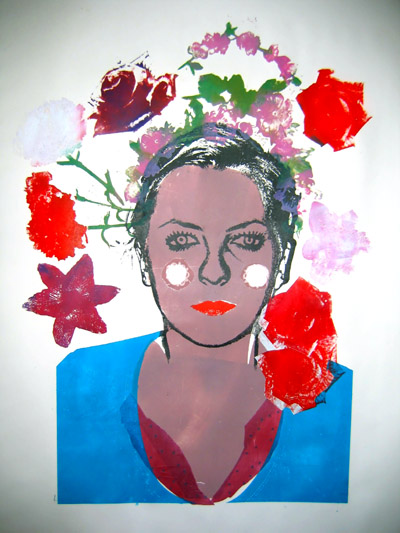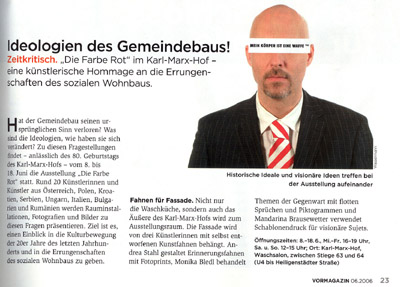„die Farbe ROT”
Ausstellung, 8.-18. Juni im Karl-Marx-Hof, Waschkueche
Eröffnung: Do. 8. Juni 2006 19 – 22 Uhr, Ausstellungsdauer: 9.-18. Juni 2006
Öffnungszeiten: mi-fr. 16-19 Uhr,& so. 12-15 uhr
Karl-Marx-Hof, Waschküche, Halteraugasse 86 (gegenüber Kindertagesheim), U4 Heiligenstadt
Ehrenschutz: Stadtrat Werner Faymann
22 KuenstlerInnen stellen zum Themenkreis „die Farbe ROT” in der Waschkueche des KMHs aus
Teilnehmende KünstlerInnen: Aleksandra Andrejewna, Marta Mikulec, Dorothée Berghaus, Barbara Höller, Renate Huber, Karin Sulimma, Joanna Styrylska , Annette Tesarek, Letizia Werth, Ewa Zasada, Göttin des Glücks, Reinhard Bernsteiner, Markus Grabenwöger, Kafri, Michael Koch, Sebastian Kudas, Peter Langkammer, Hans Riedel, Ivan Igor Sapic, Franz Wassermann, Anthony Wagner, Marcus Zobl, Mounty Zentara

 Fotos: Danuta Bibro
Fotos: Danuta Bibro
Marek Michalak – Posaune -Performance
Kuratorinnen: Renate Huber & Denise Parizek, Assistenz: Naima Boukacem
Organisatoren: verein zuhaus, www.kunst-zuhaus.at in Kooperation mit Wiener-Krakauer Kultur- Gesellschaft

Lithographie von Joanna Styrylska „Lola”

Farbe Rot von Ewa Zasada

von Aleksandra Andrejewna „Gehirnwäsche“

Fabryka von Joanna Styrylska
Die Serie thematisiert die sozialistische und kommunistische Propaganda und ist eine Auseinandersetzung mit den damaligen sowie den heutigen Ideologien.
Wer sind wir und wo sind wir heute?
Was hat sich verändert und welche Richtung streben wir an?
Welcher Gehirnwäsche werden wir heute unterzogen?
Alle Plakate enthalten einen Bruchteil der Geschichte und alle beziehen sich auf die Gegenwart….
Joanna Styrylska, geb. 16.01.80 in Katowice, Diplom (Juni 2006) in Graphik an der Krakauer Akademie der Bildenten Künste (ASP), 2001 Stipendium des Ministeriums für Kunst und Kultur. Austellungen: Zentrum der modernen Kunst „Solvay” 2005 Galerie des Clubs „Alchemia” 2005, Krakau.Die Ausstellung „Rosso” inspirierte mich zur Erschaffung einer Graphikreihe, die auf den Erinnerungen aus meiner Kindheit beruht. Ich bin in der Zeit der politischen Transformation in Polen aufgewachsen, Ende der 80er und Anfang der 90er Jahre:
– Arbeiterproteste
– dynamische Entwicklung der Bewegung „Solidarnosc”
– Kriegszustand
– PRL Untergang
Rot wurde zu einem Assoziationselement: die polnische Fahne, Blut, Nelken…
Die in den Augen des Kindes und später eines Teenegers interpretierte
Geschichte stimmte nicht immer mit dem Wirklichkeitsdrama überein.
Die Interpretationen dieser Zeit schlugen oft einen anderes Tor an: die erste und die einzige Barbiepuppe, gekauft für illegal erworbene Dollars oder der Geschmack erstes Getränkes aus der Dose. Daher kommt es in den Graphiken zu der Verbindung der naiven Welt eines Kindes und den authentischen Symbolen jener Zeit. Technik: Lithographie verbunden mit Collage.
Ewa Zasada. AFTERIMAGES OF LIGHT – INSTALLATION
Out of all submitted earlier projects for my installation I have chosen one called „Powidok”-(afterimages of light) Project consists of installation / hanging of a swing (painted green) over a circle heaped up on the ground immediately under the swing (radius of the circle about 3 meters – ring created out of coal or coal-dust and circle-shaped surface covered with red gummy bears.
An organism familiarizes itself with a death as well as it does with a life. At the time of our birth many of our cells are simply withering away.
We are witnessing numerous amounts of „tentative deaths” these crucial alarms of an organism signaling approaching danger: infections, blood clots, cuts, faints.
The race of life and time still persist. The moment we are able to enlighten ourselves of the inevitability of the processes in our bodies is crucial.
This is a painful ritual of transition: from warm, moist and safe childhood to gene-type casino, life’s cruel roulette.
The imagine to remember: a child with a wounded hand considers a human body as a sack filled with blood, covered with soft skin, easy to cut through.
Sebastian Kudas – ein Grafiker und Bühnenbildner aus Krakau, Piwnica pod Baranami
Wiersz Ewy Lipskiej „Chłopcy” to spojrzenie dojrzałej osoby na młode pokolenie. Pełne ciepła i delikatnej ironii patrzenie na – często naiwne – borykanie się z pytaniami jakie stawia życie – tymi najprostszymi i najtrudniejszymi.
Jak zwykle, poezja Lipskiej operuje skrótem. Jest lapidarna i pełna odkrywczych metafor.
Przygotowując serię rysunków p.t. „Chłopcy” użyłem grubej, prostej kreski by uzyskać prostotę jaka jest w konstrukcji wiersza, natomiast czerwony kolor – symbol życia i energii – ma nasycić rysunek emocjami. Napięciem.
The poem “Boys” by Ewa Lipska, is a view point of a mature person on a young generation. It’s a look on frequently naïve struggle with questions that life asks – the simple and the most difficult ones. A look fool of subtle irony.
As usually, Lipska’s poetry uses brevity. It’s lapidary and fool of revealing metaphors.
Preparing the cycle of pictures “Boys”, I used a thick and straight line to show the simplicity which exists in the poem’s construction. Red colour – symbol of life and energy is supposed to fill the picture with emotions and tension.
 Marek Michalak – absolwent Musik Konserwatorium w Krakowie, wspolzalozyciel znanej krakowskiej grupy jazzowej Old Metropolitan Band, laureat wielu nagrod na miedzynarodowych festiwalach jazzowych w Polsce, Holandii, Belgii, USA. Od 30 lat gra w zespole Jazz Band Ball Orchestra. Od wielu lat wspolpracuje z Piwnica Pod Baranami jako muzyk i kompozytor. Kompozytor i aranzer, aktulnie wydana plyta smuth jazzowa ” Someone”.
Marek Michalak – absolwent Musik Konserwatorium w Krakowie, wspolzalozyciel znanej krakowskiej grupy jazzowej Old Metropolitan Band, laureat wielu nagrod na miedzynarodowych festiwalach jazzowych w Polsce, Holandii, Belgii, USA. Od 30 lat gra w zespole Jazz Band Ball Orchestra. Od wielu lat wspolpracuje z Piwnica Pod Baranami jako muzyk i kompozytor. Kompozytor i aranzer, aktulnie wydana plyta smuth jazzowa ” Someone”.

